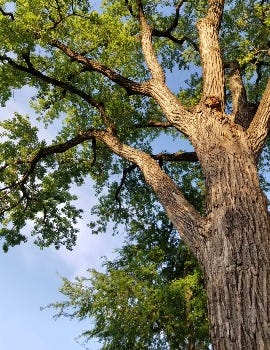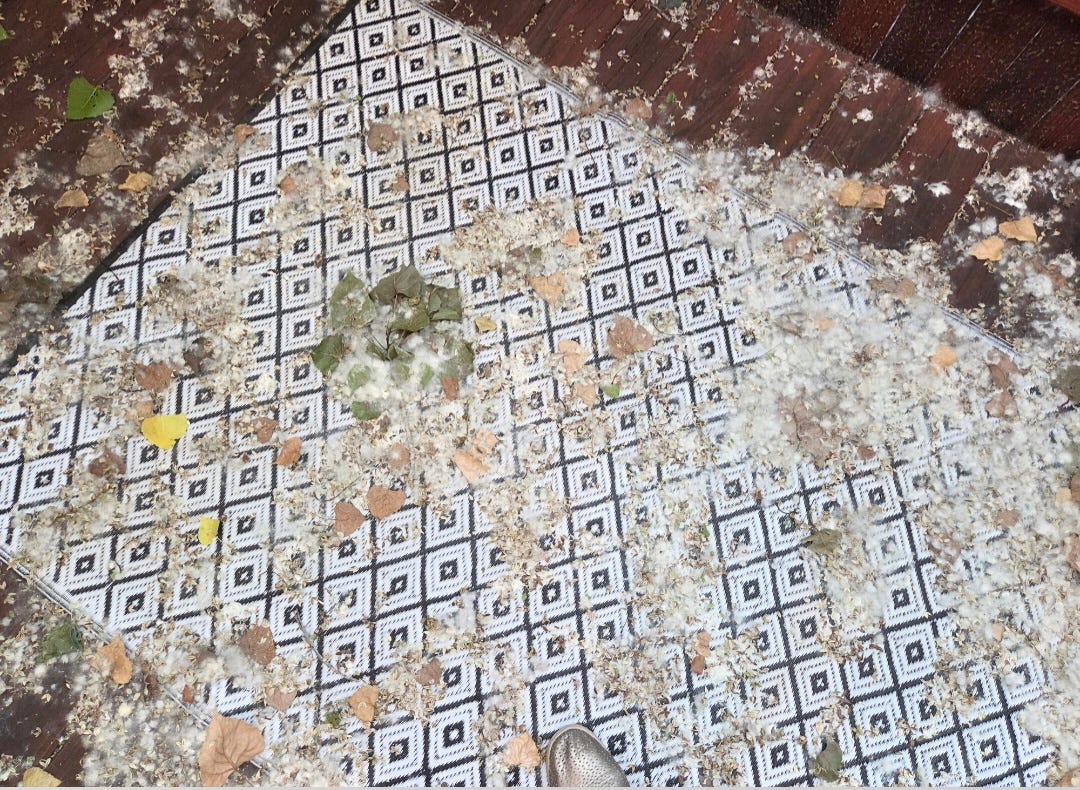It finally stopped. The blizzard of cottony white seed pods harboring their sticky goo—a ceaseless stream of puffy parachutes packed with life going on. The constant shower of fluff fell from the clear blue sky like winter’s perpetual snowstorm, but it was June in Dallas, Texas, and this was summer’s unfurling blanket. From a mighty cottonwood. Venerable and enormous, yet fragile and overgrown from years of neglect, she stood in quiet reserve most of the year, looming over my modest mid-century condo until she exploded like an overstuffed down comforter for about six weeks each summer. As one of the most substantial trees I have ever seen, much less cohabitated with, she was about eight stories tall and five feet in diameter, rooted just a couple of feet from my front porch. I have lived here for almost three years, and this was the densest cascade yet. The festoon of fuzzy flotsam found its way into every orifice—exposed and not. Every door, window, vent, nostril, ear canal, lip, eyelid, and yes, there, too. Whenever I stepped outside, my eyes teared up as the mischievous micro-stems caught in my throat with each new breath. It was like inhaling cigarette smoke that was actually Elmer’s glue. You couldn’t wave it away. You couldn’t sweep it away because the power puffs morphed and spontaneously combusted when touched. They adhered instantly to anything and formed patches of pasty oatmeal pancakes on every surface, like my deck, fence, and air conditioning units. Last year, after spending $750 on new capacitors, I purchased fancy mesh covers from Amazon.com to prevent the fervent penetration. The tailored covers reminded me of something June Cleaver might have used to cover her toaster. It was just hard to imagine how an air conditioner can function in the Texas heat while wearing a jacket. Every morning and evening during these six weeks, I went out and brushed off the fluff that collected on all sides of the covers. This was a task I never imagined would be part of my life. To use another mixed mid-century metaphor, I felt like Lucy Ricardo trapped in the Twilight Zone. It’s the lesser of two evils, I suppose, especially since the only semi-attractive plant in my HOA-maintained yard was a ragged rose bush that pierced my leg through my clothes every time I leaned in to perform my de-fluffing tasks. The irony was hard to ignore. I wondered why I was the only one in my community engulfed in this insistent cloud of ostensibly insubstantial froth. “Location. Location. Location,” they said. “On the corner,” they said. And luck, of course. “You are a product of your choices,” they also say. But also, sometimes, things just don’t work out well. Some things actually suck. That is how it is. Or maybe it’s my mischievous mother trying to insert herself through the sprinkles of uncomfortable presence. She loved the word fluffy. Sadly, this towering wooden matriarch in her seventies had far exceeded her lifespan as a cottonwood, barely hanging on in this urban location. My HOA had cut down many of our ailing trees but had avoided the three largest and most dangerous ones due to the expense. Now, that makes sense. Two of those were closest to me and had been aptly named “Thelma and Louise” by the community. But they should be Thelma and Larry, as mine was female, and the one down the sidewalk was male. I’m not surprised my overwhelmed nervous system recognized Thelma’s deeply embedded trauma at first sight. What attracted me to this location now repulsed me. A familiar refrain. It’s so bitterly sweet, as I adore trees. In fact, like Mary Oliver, I think trees have “saved me, and daily.” I wish I did not feel so frustrated about Thelma. It’s not her fault. Since losing my son Elliot and the rest of my immediate family, except my dear Ian, nature has been my most potent tonic. My reliable refuge. “In the untainted forest, cottonwoods can live for 150 years or so,” said burly Rick, the handsome and tanned arborist from Southern Botanical, as he assessed Thelma. I called him for a professional consultation out of desperation after my alleged HOA management company ignored my requests. Another tree in my yard had been so mangled in a terrible storm that the precarious limbs were continuing to crack and tumble whenever the wind gusted above 40 mph. I needed lots of tree therapy. “This should come down immediately,” dashing arborist-Rick said with certainty. “These trees have been neglected for decades. Look how the ends of their branches are dry and brittle, weighed down by overgrowth, and the trunk is infested with fungus and rot.” He also confirmed that the volume of white tufts was likely related to distress. “There is an injection we can administer at the roots that will significantly reduce the volume and duration of the fluff release,” he said. I submitted this data to the HOA board, but the hostile, self-righteous president scolded me for consulting an outside vendor like he was a high school principal—even though I was just gathering information because the HOA had not responded to my requests. “We will never pay an outside vendor you choose,” he barked in an instant message. “We gave you an answer about your tree. You just didn’t like it. We don’t have a ‘save any tree at any cost’ policy here. That’s it.” Grrr. It’s a rock and hard place. Customer service is clearly not the priority here. The HOA is legally responsible for the maintenance of the common area and “walls-out” of every unit, for which we pay healthy monthly dues. I’m so frustrated, and I detest wasting my precious energy on these petty conflicts. I own a home but have no authority over how it is maintained. I so want to cultivate a content life. Not even a fabulous one, content will do. No more HOAs to start. I am getting an Airstream next time. I always look for the lesson, and I think this one is as old as time: You can’t go home again, especially when your only notion of home is traumatic and unresponsive. That’s what feels familiar, sometimes unconsciously. I grew up just a couple of blocks from this location on the edge of an affluent neighborhood in Dallas, but my parents were not. My dad was an aerospace test engineer for a government contractor, and my mom was a marginally successful artist and teacher. She called our neighborhood “the other side of the tracks.” I suppose everything is relative. They had purchased the ordinary two-story, three-bedroom red-brick home in the last century when the middle class still existed. The house had never been updated, except for the silver duct tape my dad applied everywhere as his preferred method of repair. After my parents died, it was sold as a shell—totally gutted and redone. Apropos of everything. In moving to this condo community, which is on the edge of the edge of Highland Park, I may have been trying to find my sense of place again, but my place has always felt tenuous. My only family now was my son Ian, and he was in Austin. It’s painful and embarrassing to be looking for your place in your sixties. Believe me, I’ve read so many epiphany-producing books, like It Did Not Start with You by Mark Wolynn, about the impact of ancestral wounds. I’ve pursued nearly every flavor of therapeutic intervention. As Dorothy said in The Wizard of Oz, “There is no place like home.” But Dorothy was pretty traumatized, too—orphaned, tormented by a mean lady on a bike, and living with her cranky Auntie Em on a desolate farm, surrounded by slightly creepy adult male farmhands. Maybe there is no place like home, but there is no home like this place either. I guess I need to release the yearning of hiraeth, that longing for a home and past that never was. This flying flotsam is a powerful reminder. I don’t want to fight these inane battles or myself anymore. Let it go. Release it. Let it. Live. Notice the divine glimpses of Elliot—his frequent e-scribbles across the sky. Focus on ways to carry the pain and the joy of loss together. Recognize the memories as floating tufts of white cotton but live in the now. Good and bad, let them drift in and out of my mind without getting stuck. Align with the organic rhythm of the universe. Continue writing through the fog—not by retracing every step but by embracing every moment. And like another Elliot—T.S. Eliot— wrote, maybe this is the most meaningful lesson of seeing the place for the first time. “We shall not cease from exploration T.S. Eliot, from “Little Gidding,” Four Quartets, 1943 You're currently a free subscriber to Grief Matters. For the full experience, upgrade your subscription. |
Sunday, 21 September 2025
Living in the Cottonwood Castle
Subscribe to:
Post Comments (Atom)
Living in the Cottonwood Castle
It finally stopped. ͏ ͏ ͏ ͏ ͏ ͏ ͏ ͏ ͏ ͏ ͏ ͏ ͏ ͏ ͏ ͏ ͏ ͏...
-
Welcome back to America's #1 Daily Podcast, featuring America's #1 Real...
-
Robert Gore posted: "We can only hope—preferably a new, much freer nation. From James Kirkpatrick at unz.com: Earlier...



No comments:
Post a Comment